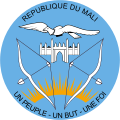 |
|---|
Minister of Foreign Affairs of the Republic of Mali is a government minister in charge of the Ministry of Foreign Affairs of Mali, responsible for conducting foreign relations of the country.
The following is a list of foreign ministers of Mali since its founding in 1960:
| No. | Name (Birth–Death) | Portrait | Tenure |
|---|---|---|---|
| 1 | Modibo Keïta (1915–1977) | 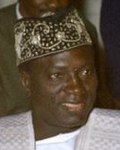 | 1960–1961 |
| 2 | Baréma Bocoum (1914–1973) |  | 1961–1964 |
| 3 | Ousmane Ba (1919–1999) |  | 1964–1968 |
| 4 | Jean-Marie Koné (1913–1988) |  | 1968–1969 |
| 5 | Sori Coulibaly (b. 1925) |  | 1969–1970 |
| 6 | Charles Semba Sissoko |  | 1970–1978 |
| 7 | Yusuf Traoré (b. 1935) |  | 1978–1979 |
| 8 | Alioune Blondin Beye (1939–1998) |  | 1979–1986 |
| 9 | Modibo Keita (1942–2021) | 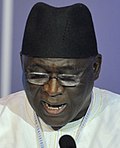 | 1986–1989 |
| 10 | N'Golo Traoré (b. 1937) |  | 1989–1991 |
| 11 | Souleymane Sidibé (b. 1949) |  | 1991 |
| 12 | Tiébilé Dramé (1955–2025) |  | 1991–1992 |
| 13 | Mohamed Aloussine Touré |  | 1992–1993 |
| 14 | Ibrahim Boubacar Keïta (1945–2022) |  | 1993–1994 |
| 15 | Sy Kadiatou Sow (b. 1955) |  | 1994 |
| 16 | Dioncounda Traoré (b. 1942) |  | 1994–1997 |
| 17 | Modibo Sidibé (b. 1952) |  | 1997–2002 |
| 18 | Lassana Traoré (b. 1945) |  | 2002–2004 |
| 19 | Moctar Ouane (b. 1955) | 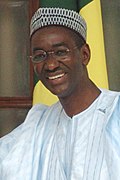 | 2004–2011 |
| 20 | Soumeylou Boubèye Maïga (1954–2022) | 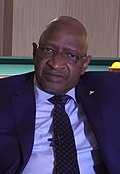 | 2011–2012 |
| 21 | Sadio Lamine Sow (b. 1952) |  | 2012 |
| 22 | Tiéman Coulibaly (b. 1967) |  | 2012–2013 |
| 23 | Zahabi Ould Sidi Mohamed (b. 1957) |  | 2013–2014 |
| 24 | Abdoulaye Diop (b. 1965) | | 2014–2017 |
| (22) | Tiéman Coulibaly (b. 1967) |  | 2017–2018 |
| 25 | Kamissa Camara (b. 1983) |  | 2018–2019 |
| (12) | Tiébilé Dramé (1955–2025) |  | 2019–2020 |
| 26 | Zeïni Moulaye (b. 1954) |  | 2020–2021 |
| 27 | Abdoulaye Diop (b. 1965) | | 2021–present |
